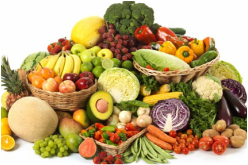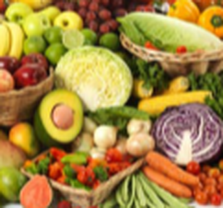
Although the science is strong showing that many cancers, high blood pressure, most diabetes and most heart disease can be entirely prevented by following a whole food plant based diet, it is easy to be confused and not realize just how compelling this science is. Just like in the "debate" over whether human activity is causing climate change -- powerful monied interests do a lot to make it appear that the science is divided and inconclusive-- when in fact it is overwhelmingly aligned with one perspective in each case -- humans ARE modifying the weather, and eating meat, dairy and eggs DOES increase the risk of our most common causes of death and disability.
Yet headlines suggesting things like, "Saturated Fat is Back!" mislead many, who don't realize what went on behind the scenes that led to those headlines. It is important to recognize this larger context before I can address the title of this post. But we'll set all that aside for now in order to address a very real phenomenon that does sometimes happen: People try a plant-based diet -- but don't stick with it, saying something along the lines of, "I just wasn't feeling so good." There are some very simple reasons WHY this sometimes happens and being informed of these can help you be more successful and not get derailed. Here are my top five reasons why someone might feel worse after trying to be vegan:
1) They weren't eating enough! We get use to eating a certain amount of food -- based upon visual cues, or how full we feel after eating. When we shift away from meat, dairy or eggs which have a lot of calories per cup of food and eat more plants which have much more fiber and far fewer calories, we can feel fuller from what seems like the same amount of food -- but suddenly be getting only half the calories. For those who start out at about a healthy weight -- they may feel weak because they don't need to lose any more weight -- it's their body telling them they need more fuel. That's like trying to run your car the same distance but with only half the gas. Compared to meat, dairy and eggs -- most plant derived foods -- especially if they are made without using any added oils -- which is the healthiest way to eat, do not pack as many calories. The solution? You need to eat more food! (And if you don't need to lose any weight -- eat more raw nuts and seeds -- as these are the most calorically dense of the whole plant foods.)
Yet headlines suggesting things like, "Saturated Fat is Back!" mislead many, who don't realize what went on behind the scenes that led to those headlines. It is important to recognize this larger context before I can address the title of this post. But we'll set all that aside for now in order to address a very real phenomenon that does sometimes happen: People try a plant-based diet -- but don't stick with it, saying something along the lines of, "I just wasn't feeling so good." There are some very simple reasons WHY this sometimes happens and being informed of these can help you be more successful and not get derailed. Here are my top five reasons why someone might feel worse after trying to be vegan:
1) They weren't eating enough! We get use to eating a certain amount of food -- based upon visual cues, or how full we feel after eating. When we shift away from meat, dairy or eggs which have a lot of calories per cup of food and eat more plants which have much more fiber and far fewer calories, we can feel fuller from what seems like the same amount of food -- but suddenly be getting only half the calories. For those who start out at about a healthy weight -- they may feel weak because they don't need to lose any more weight -- it's their body telling them they need more fuel. That's like trying to run your car the same distance but with only half the gas. Compared to meat, dairy and eggs -- most plant derived foods -- especially if they are made without using any added oils -- which is the healthiest way to eat, do not pack as many calories. The solution? You need to eat more food! (And if you don't need to lose any weight -- eat more raw nuts and seeds -- as these are the most calorically dense of the whole plant foods.)
2) They inadvertently started consuming more gluten. Many people have no idea that they are gluten intolerant, and there is evidence that our current methods of testing for gluten-intolerance are missing many who would benefit from going gluten free. When such people, reduce or eliminate meat, dairy and eggs, if they are not careful, they could end up eating more bread, pasta and baked goods. Many vegan faux meats are made loaded with gluten too. One of the more common symptoms of gluten reaction is depression, or even just a general feeling of spaciness. This often get's misattributed to a lack of animal protein -- when in fact -- they are not missing anything -- they simply need to cut out wheat, barley, rye, spelt and oats! When making the change to vegan, be careful that you are not eating more processed foods and or gluten. Emphasize beans, starchy vegetables and leafy greens as the foundation of your new plant-based diet. Include small amounts of raw nuts and seeds
3) They weren't properly supplementing vitamin B-12. We only need a very tiny bit, but this vitamin, which is only produced by bacteria is critical to keeping our heart, brain and nerves healthy. Our ancestors, living in unsanitary environments, had no problem getting enough B-12, but today we chlorinate our water, wash hands after changing the baby's diaper, and don't eat our vegetables with dirt still clinging to them as many other animals do, (which is why they have B-12 in their body, which meat eaters MAY be able to absorb--but not always) and so we can become B-12 deficient. But it's not just a vegan issue -- as we age and gut problems increase, even omnivores are at risk. That's why the Institute of Medicine recommends that EVERYONE over age 50 supplement B-12. Don't count on swallowed pills either -- use a sublingual - that dissolves under the tongue, which bypasses gut problems by getting absorbed directly through the mucus membranes. For more on B-12 read this post I wrote about it.
4) Their gut micro biome needs more time to adapt! A growing body of research is suggesting that the types and numbers of specific bacteria living in our digestive tract is critical to our health and well-being, and may influence things like digestion, mood, and immunity. It turns out, that what we have been eating exerts a profound influence upon our gut micro biome - the number and types of organisms living inside of us. In addition, sudden changes in the amount of fiber we eat for example, can cause uncomfortable gut symptoms -- but don't despair -- your microbes will adapt. Some people find that shifting their diet gradually over several weeks works better for them -- others find that taking enzymes with meals is helpful too. I had been vegan for many years already when I learned just how incredibly healthy beans were, and decided to start eating several servings of them every day. Surprisingly, once I started eating lots of beans (and presumably had selected for colonies of gut bacteria that appreciated this) I noticed that I no longer had any reaction to eating beans -- which I had sometimes experienced when they were a less frequent part of my diet.
5) Anytime we attempt to make a significant change in our behavior, it is likely to stir up our anxiety for awhile. And increased anxiety usually makes us feel worse. This is even more likely to be the case, if important people in our life would prefer that we not make this change. Just like when an alcoholic quits drinking -- sometimes there is "pushback" from friends and family who resent how the alcoholic's change may alter customs or behaviors that they would prefer to keep as is. But unlike alcohol, meat, dairy and eggs, are even more ubiquitous, and consuming them is reinforced by many of our defining rituals too. The solution? Work to create a new social network that reinforces your new lifestyle. Find others who will encourage your journey -- join a vegan potluck, take plant-based cooking classes, participate in on-line forums. Watch documentaries and read books to keep reminding yourself of why this is important to you. Work hard to keep exposing yourself to information, ideas and others which will reinforce and empower your new choices.

